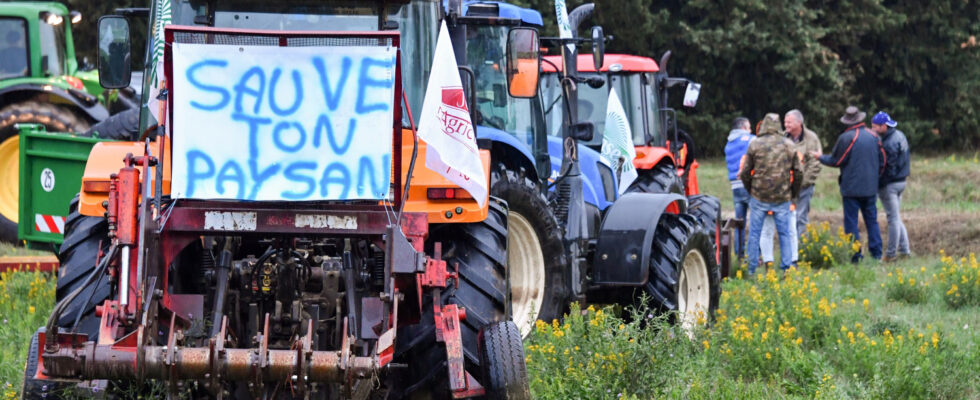They still want to “shake the coconut palm” to see concrete measures on their farms: Gabriel Attal receives Tuesday morning the majority agricultural unions FNSEA and Young Farmers, looking for a difficult way out of the crisis despite the numerous pledges already given by the government. The presidents of the National Federation of Farmers’ Unions (FNSEA) and Young Farmers (JA), Arnaud Rousseau and Arnaud Gaillot, are received in Matignon for a new meeting with the Prime Minister.
Also participating in this exchange are the ministers of Agriculture (Marc Fesneau and his delegate minister Agnès Pannier-Runacher) and of Ecological Transition (Christophe Béchu). Arnaud Rousseau called on the executive to “tackle the big issues” in an interview with Les Echos published Tuesday, calling in particular for acceleration on the issue of water storage and “fiscal measures” to modernize and transmit the exploitations.
Expected simplifications
On water storage, for which the government has already announced simplification measures, he calls for concrete effects to be seen very quickly: “We must start by making our administration and our procedures much more efficient. This can be achieved through orders or regulations, and therefore move quickly.”
Arnaud Rousseau also calls for “a fiscal incentive measure which could push some to transfer earlier and accelerate the modernization of our agriculture”, recalling that “of the 400,000 farms in France, at least 150,000 are affected by retirement within five at seven years old. He suggests increasing from 20% to 50% the reduction that farmers benefit from on the tax on undeveloped land, which “would cost around 150 million to public finances” according to him.
The slowness of measures denounced
The president of the JA, for his part, recognized progress which is going “in the right direction”, but deplores the slow deployment of the measures announced by the government. “When you are the elected politician, it is you who command your various ministries. And so you have to shake the coconut tree morning, noon and evening,” argued Arnaud Gaillot Tuesday morning on RTL. The government highlights the work already carried out, with “62 commitments” made by Gabriel Attal, gradually declined, whether at the European level with fallows and meadows, or at the national level with a reflection on phytosanitary measures, the support for livestock breeding or organic agriculture.
In addition to several hundred million euros of emergency measures announced, the government has satisfied numerous demands from agricultural unions, first and foremost a “shock of simplification” to facilitate the daily lives of farmers overwhelmed by complex paperwork and standards deemed unsuitable, for example for the management of hedges. At the heart of the discussions is also the agricultural orientation bill which will be presented to the Council of Ministers on March 29.
Sporadic actions
The protest movement has subsided since the beginning of February but actions are still carried out sporadically. On Monday, farmers demonstrated near Toulouse to protest against a delay in payment of European aid; Tuesday morning, members of the FNSEA du Nord dumped straw in front of the premises of the Regional Directorate for the Environment and Development (Dreal) in Gravelines and hung a banner proclaiming “No ecological transition without viable agriculture! “.
In a still tense climate, ten days before the FNSEA annual congress, Tuesday’s meeting comes after the postponement of a meeting planned for this week with President Emmanuel Macron. It was to close the sequence of peasant anger and mobilizations organized throughout France since January – and up to the Agricultural Show where the president was copiously booed. Arnaud Rousseau announced on Saturday evening the postponement of this meeting planned at the Elysée, explaining that “the conditions to emerge from the agricultural crisis (were) not met” but refusing to “put this responsibility on the unions”.
